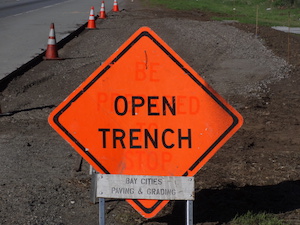
But closed conversation.
The latest version of a U.S. senate bill aimed at boosting broadband availability cuts out language from a previous version that would have encouraged, but not required, federal agencies to include conduit in highway projects. Senate bill 2555, also known as the Mobile Now act, would clear more wireless spectrum for broadband purposes and streamline access to federal property in order to install both wireline and wireless facilities.
The bill was approved, with bipartisan support, by the senate commerce, science and transportation committee and is now on track for a full senate vote. But it lacks the dig once policy in the original version.
I don’t know why that’s so, but I’ll speculate a bit. Dig once requirements are often opposed by deep pocketed incumbent telephone and cable companies, who build their own infrastructure and would prefer that smaller competitors not have access to cheap and freely available conduit. Transportation agencies and public works people will also tend to oppose dig once rules on occasion, because it adds costs and extra hassles to road projects that are already expensive and complicated.
Three other federal dig once bills are pending in the U.S. congress, so it’s not a completely lost cause, although those are all currently stalled in committee.
That’s not to say the Mobile Now act is a bad bill. More spectrum is always needed, and master leases and a central data base for federal broadband-relevant assets will be very welcome. It’s just not as good as it was in its original form.
In Sacramento, assembly bill 1549, authored by Jim Wood (D – Healdsburg) targets Caltrans projects, requiring the agency to maintain a public database of conduit it installs. It’s also awaiting committee approval in the state senate.
